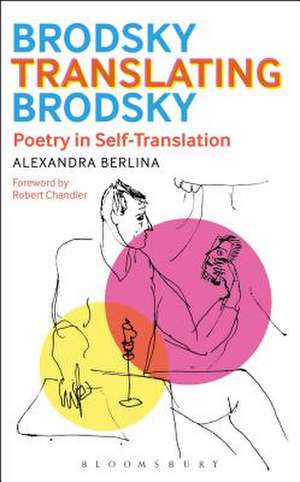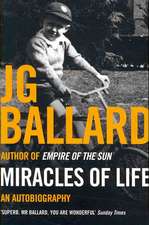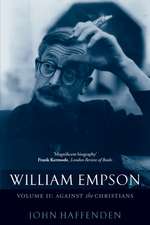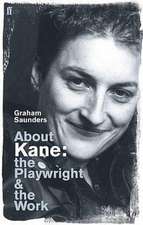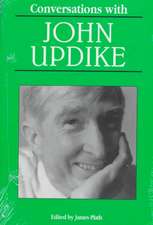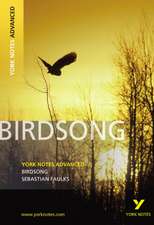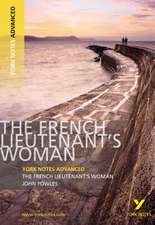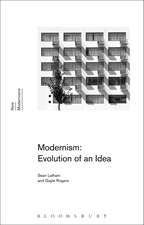Brodsky Translating Brodsky: Poetry in Self-Translation
Autor Dr. Alexandra Berlina Introducere de Robert Chandleren Limba Engleză Paperback – 21 oct 2015
| Toate formatele și edițiile | Preț | Express |
|---|---|---|
| Paperback (1) | 256.59 lei 6-8 săpt. | |
| Bloomsbury Publishing – 21 oct 2015 | 256.59 lei 6-8 săpt. | |
| Hardback (1) | 714.51 lei 6-8 săpt. | |
| Bloomsbury Publishing – 18 iun 2014 | 714.51 lei 6-8 săpt. |
Preț: 256.59 lei
Preț vechi: 294.91 lei
-13% Nou
Puncte Express: 385
Preț estimativ în valută:
49.10€ • 51.39$ • 40.87£
49.10€ • 51.39$ • 40.87£
Carte tipărită la comandă
Livrare economică 31 martie-14 aprilie
Preluare comenzi: 021 569.72.76
Specificații
ISBN-13: 9781501314285
ISBN-10: 1501314289
Pagini: 232
Dimensiuni: 152 x 229 x 25 mm
Greutate: 0.32 kg
Editura: Bloomsbury Publishing
Colecția Bloomsbury Academic
Locul publicării:New York, United States
ISBN-10: 1501314289
Pagini: 232
Dimensiuni: 152 x 229 x 25 mm
Greutate: 0.32 kg
Editura: Bloomsbury Publishing
Colecția Bloomsbury Academic
Locul publicării:New York, United States
Caracteristici
Shows translation studies as a method which can help fruitfully analyze texts and connect disciplines
Notă biografică
Alexandra Berlina is Postdoctoral Researcher in Literary Studies at the University of Erfurt, Germany. Her translations of Brodsky's poems "Dido and Aeneas" and "You can't tell a gnat..." have won awards from the 'Willis Barnstone Translation Prize' and the 'The Joseph Brodsky/Stephen Spender Prize'.Robert Chandler is an award-winning poet and translator from Russian, French, and Greek. Among the writers he has translated from Russian are Alexander Pushkin, Nikolay Leskov, Vasily Grossman and Andrey Platonov. He is the co-editor of the Penguin Classics anthology Russian Poetry from Pushkin to Brodsky (2014). Penguin have also published his anthologies of Russian short stories and of Russian magic tales.
Cuprins
AcknowledgmentsNote on the Text Foreword: Post-Modernist Chants, Robert Chandler1. What Is It All About? 2. "December in Florence" 2.1. The Matter of Meter and the Force of Form 2.2. "The doors take in air, exhale steam; you, however, won't." 2.3 "Sunk in raw twilight, the pupil blinks but gulps." 2.4. "Cats check at noon under benches ."2.5. "A man gets reduced to pen's rustle on paper." 2.6. "Quays resemble stalled trains." 2.7. "In a dusty café, in the shade of your cap." 2.8. "Taking in air, exhaling steam." 2.9. "The stone nest resounds with a piercing squeal." 2.10 "There are cities one won't see again." 3. Three Nativity Poems 3.1. "Star of the Nativity" 3.2. "Nativity" 3.3. "Lullaby" 3.4. A Delicate Balance: Brodsky's Nativity Poetry 4. Poems à Clef: M.B.'s Birthday 4.1. "The Polar Explorer" 4.2. "Minefield Revisited" 5. Elegies 5.1. "In Memoriam" 5.2. "In Memory of my Father: Australia," "August Rain" 5.3. "To a Friend: In Memoriam" 6. Beyond Translation: "Centaurs" and Other Hybrids 6.1. Word Play in Translation and the Centauric Self-Portrait 6.2. "Centaurs" 6.3. A Matter of (Con-)Sequence 6.4. Beyond Translation: "Epitaph for a Centaur" 7. Further Beyond Translation: "Sextet" and Other Excavations 7.1. "An eyelid is twitching..." 7.2. "Sometimes in the desert you hear a voice" 7.2. "For thirty-six years I've stared at fire" 7.3. "Where's that?" 7.4. "Was the word ever uttered?" 7.5. "And I dread my petals' joining the crowned knot" 7.6. "Letter to an Archeologist" and the Translation-Creation-Continuum 8. Themes Taking Root in Translation and Other Tendencies 8.1. Wet Dreams 8.2. Hurtful Horizons 8.3. More Tendencies in Translation Bibliography Index
Recenzii
The author's sensitive and insightful readings of Brodsky's poems both in the Russian original and in English translation-to the point where it becomes unclear which one is the original and which one the translation in any given case, and whether the neat distinction between original and translation ought to be taken for granted more generally-illuminate Brodsky's poetics and technique to an unprecedented degree by laying bare their semantic, grammatical, syntactical, and phonological workings.
Alexandra Berlina's fascinating and intriguing book presents a selection of poems which Brodsky translated on his own, along with the original Russian and a line-for-line literal. What she then offers is a close reading of the end-product in both languages, showing a fine sensitivity not just to semantic correspondences (or failures of correspondence), but also to phonetic patterning and nuances. ... All in all, the book presents a persuasive case for translation, as well as the reading of a translation, as a way to get to closer grips with a poetic text.
Berlina has succeeded in achieving her . stated goals-namely, discussing particular poems and advertising translation studies as a method of close reading. . This is a book that should interest all readers of Brodsky's poetry, whether in Russian, English, or both, as well as those who wish to explore self-translation as a continuation of poetic creativity, not just as a secondary pursuit. Berlina writes with admirable succinctness and clarity; her authorial persona is that of an expert but approachable guide to the crossing and recrossing of borders between languages and cultures. ... She sees his self translations as occasions for the poet to play with the opportunities a new language and cultural frame of reference off ered him to rework his poems, a conclusion that is well supported by the carefully conducted and enjoyable close readings provided in this book.
Alexandra Berlina makes an invaluable contribution to our understanding of one of the major poets of the late twentieth century . her book is a model for critical engagement with translation, and a corrective to the dominance of theory over practice in the burgeoning discipline of Translation Studies . if we hope to understand and appreciate Brodsky's accomplishment as a poet and thinker, we must confront the full corpus of his work in a dynamic, comparative fashion. Berlina does this brilliantly, and with a degree of wit that would have made her subject proud.
.An important contribution to international Brodsky studies, Berlina's book uses the poet's self-translations to arrive at detailed reinterpretations of his work. In this way Berlina redefines the concept of translation, looking at Brodsky's poems rendered into English by the poet himself as if they were variants of his original poems, comparable in status to Beckett's self-translations. Berlina's illuminating and often provocative study is worth a careful reading, if only to see how she manages to integrate Brodsky's self-translations with the poet's oeuvre and link them with his dislocated biography.
Joseph Brodsky's self-translations have until recently attracted astonishingly little scholarly attention, even though Brodsky, as the winner of the Nobel Prize and Poet Laureate of the United States, was the most highly decorated of all Russian-American literary immigrants. . Self-translation is never easy. In Berlina's opinion, what ultimately prompted Brodsky to engage in this endeavor was not really, or not primarily, the wish to make his Russian poems accessible to an American audience, or to somehow transform his Russian self into an American self. It was simply 'the fact that translation gave Brodsky a chance to rework his poems, albeit in a different language.' . Written in a lively style and replete with astute observations and provocative insights, Berlina's book is a joy to read. It is highly recommended not only for Brodsky specialists, but for anyone interested in the problem of self-translation, or the intricacies of poetic translation in general.
Alexandra Berlina's book is a nuanced [and] well-informed ... reading of the bilingual poetry by the Nobel Prize-winning Russian American poet Joseph Brodsky. ... Berlina's command of both languages, Russian and English, allows for fluent switches between the two and leads to some insightful comments on Brodsky's texts.
An excellent introduction to Brodsky's work, it offers a fascinating study of the relevance of translation in literary studies ... A truly fascinating book.
What Brodsky inherited from the Russian tradition was a belief in poetry as a sacrament; what he inherited from the Anglo-American tradition was an enjoyment of poetry as a space for the free play of the intellect. No one has written as clearly and comprehensively as Berlina about Brodsky's successes and failures in his attempt to integrate these traditions.
Alexandra Berlina's careful and ingenious analysis of Brodsky's poetry throws new light on his work, and on the process of translating Russian poetry altogether. Berlina's position as a Russian writer abroad gives her great insight into the matter of Brodsky's autotranslations. Her close readings of both poems and translations are a particular joy as they benefit from her own work as a translator of Brodsky's poetry. This is an illuminating, playful and highly original guide to the great poet.
Berlina's careful reading shows that Brodsky's self-translations add an illuminating dimension to his poetry.
This study is a dazzling critique of Brodsky's self-translations, and a revealing exposition of his translingual imagination. The analyses are stunning in their intimate knowledge of two, sometimes three languages . We believe Brodsky Translating Brodsky is a seminal, path-breaking book. It provides insights not only into translation, but into the Russian language as well as the English language; it illuminates the creative process in a multilingual worldly poet, for whom the differences in language serve as catalysts for original composition. For this, as well as for the innumerable incisive close readings in Brodsky's oeuvre, we believe Alexandra Berlina's Brodsky Translating Brodsky: Poetry in Translation deserves the 2016 Anna Balakian Prize for the best first book by a young comparatist.
Alexandra Berlina's fascinating and intriguing book presents a selection of poems which Brodsky translated on his own, along with the original Russian and a line-for-line literal. What she then offers is a close reading of the end-product in both languages, showing a fine sensitivity not just to semantic correspondences (or failures of correspondence), but also to phonetic patterning and nuances. ... All in all, the book presents a persuasive case for translation, as well as the reading of a translation, as a way to get to closer grips with a poetic text.
Berlina has succeeded in achieving her . stated goals-namely, discussing particular poems and advertising translation studies as a method of close reading. . This is a book that should interest all readers of Brodsky's poetry, whether in Russian, English, or both, as well as those who wish to explore self-translation as a continuation of poetic creativity, not just as a secondary pursuit. Berlina writes with admirable succinctness and clarity; her authorial persona is that of an expert but approachable guide to the crossing and recrossing of borders between languages and cultures. ... She sees his self translations as occasions for the poet to play with the opportunities a new language and cultural frame of reference off ered him to rework his poems, a conclusion that is well supported by the carefully conducted and enjoyable close readings provided in this book.
Alexandra Berlina makes an invaluable contribution to our understanding of one of the major poets of the late twentieth century . her book is a model for critical engagement with translation, and a corrective to the dominance of theory over practice in the burgeoning discipline of Translation Studies . if we hope to understand and appreciate Brodsky's accomplishment as a poet and thinker, we must confront the full corpus of his work in a dynamic, comparative fashion. Berlina does this brilliantly, and with a degree of wit that would have made her subject proud.
.An important contribution to international Brodsky studies, Berlina's book uses the poet's self-translations to arrive at detailed reinterpretations of his work. In this way Berlina redefines the concept of translation, looking at Brodsky's poems rendered into English by the poet himself as if they were variants of his original poems, comparable in status to Beckett's self-translations. Berlina's illuminating and often provocative study is worth a careful reading, if only to see how she manages to integrate Brodsky's self-translations with the poet's oeuvre and link them with his dislocated biography.
Joseph Brodsky's self-translations have until recently attracted astonishingly little scholarly attention, even though Brodsky, as the winner of the Nobel Prize and Poet Laureate of the United States, was the most highly decorated of all Russian-American literary immigrants. . Self-translation is never easy. In Berlina's opinion, what ultimately prompted Brodsky to engage in this endeavor was not really, or not primarily, the wish to make his Russian poems accessible to an American audience, or to somehow transform his Russian self into an American self. It was simply 'the fact that translation gave Brodsky a chance to rework his poems, albeit in a different language.' . Written in a lively style and replete with astute observations and provocative insights, Berlina's book is a joy to read. It is highly recommended not only for Brodsky specialists, but for anyone interested in the problem of self-translation, or the intricacies of poetic translation in general.
Alexandra Berlina's book is a nuanced [and] well-informed ... reading of the bilingual poetry by the Nobel Prize-winning Russian American poet Joseph Brodsky. ... Berlina's command of both languages, Russian and English, allows for fluent switches between the two and leads to some insightful comments on Brodsky's texts.
An excellent introduction to Brodsky's work, it offers a fascinating study of the relevance of translation in literary studies ... A truly fascinating book.
What Brodsky inherited from the Russian tradition was a belief in poetry as a sacrament; what he inherited from the Anglo-American tradition was an enjoyment of poetry as a space for the free play of the intellect. No one has written as clearly and comprehensively as Berlina about Brodsky's successes and failures in his attempt to integrate these traditions.
Alexandra Berlina's careful and ingenious analysis of Brodsky's poetry throws new light on his work, and on the process of translating Russian poetry altogether. Berlina's position as a Russian writer abroad gives her great insight into the matter of Brodsky's autotranslations. Her close readings of both poems and translations are a particular joy as they benefit from her own work as a translator of Brodsky's poetry. This is an illuminating, playful and highly original guide to the great poet.
Berlina's careful reading shows that Brodsky's self-translations add an illuminating dimension to his poetry.
This study is a dazzling critique of Brodsky's self-translations, and a revealing exposition of his translingual imagination. The analyses are stunning in their intimate knowledge of two, sometimes three languages . We believe Brodsky Translating Brodsky is a seminal, path-breaking book. It provides insights not only into translation, but into the Russian language as well as the English language; it illuminates the creative process in a multilingual worldly poet, for whom the differences in language serve as catalysts for original composition. For this, as well as for the innumerable incisive close readings in Brodsky's oeuvre, we believe Alexandra Berlina's Brodsky Translating Brodsky: Poetry in Translation deserves the 2016 Anna Balakian Prize for the best first book by a young comparatist.
